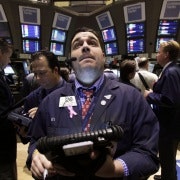Solar's biggest collapse
China's Suntech Power Holdings entered bankruptcy proceedings last week after it defaulted on $US541 million of bonds due on March 15. Eight Chinese banks asked a local court to push Suntech's main unit in Wuxi into bankruptcy. The court accepted the petition on March 21.
The world's largest maker of panels two years ago, Suntech is now dubbed the solar industry's biggest corporate failure. Solar has been a heavily oversupplied market globally and this has dragged down panel prices 69 per cent in the last two years, piling pressure on manufacturers. In an emailed response to questions from Bloomberg News, Suntech said it "will continue operations through the restructuring period."
That may be challenging given that some buyers would have reservations sourcing from Suntech.
SAG Solarstrom, a German developer that bought Suntech panels in September, is now scouting for other suppliers. "We wouldn’t buy Suntech components in the current condition," said Jutta Lorberg, a spokeswoman for the company.
The bankruptcy may wipe out more than $US1.28 billion that Wall Street and debt investors funnelled into Suntech, which also has credit lines from International Finance Corporation and China Development Bank.
The local government of Wuxi is keen to preserve the company and the 10,000 jobs it provides locally. Weiping Zhou – formerly the chairman of Guolian Futures – has been appointed as president of the company. Guolian Futures is a unit of Wuxi Guolian Development, which is partly owned by the government of Wuxi.
The other Chinese solar companies displayed business-as-usual signs. Renesola – the third largest solar wafer maker – secured a 15-year, $US52 million loan from the state-backed China Development Bank last week to support its operations. The company also makes panels.
Hanwha SolarOne – another Chinese producer of panels – projected higher shipments next year on the back of growing demand in markets like Japan and South Africa. The loss-making company plans to ship 1,300-1,500MW in 2013, compared to 830MW last year. "Profitability will remain challenging for most if not all of 2013, but we feel confident that we are making good progress on the return to a path of profitability," said Ki-Joon Hong, CEO of the company, last week.
China's largest solar-cell maker, JA Solar, announced that it was prepared to repay debt maturing in May. "Our bonds don't have default risks," Xie Jain, chief operating officer said last week.
The ripples emanating from China reached the shores of Europe nevertheless. Robert Bosch, the world's biggest car-parts maker, decided to call time on its $US2.6 billion foray into the solar sector. The company will stop production of solar ingots, wafers, cells and panels early next year and try to sell assets "as soon as possible," CEO Volkmar Denner said.
Though the Cyprus bailout discussions ensured an angst-ridden week for Europe, there was some balm available from developments in clean energy.
Germany decided not to blight its renewable energy sector with retroactive tariff cuts. Chancellor Angela Merkel said the move was important to "calm" investors and owners of clean power plants. The frantic pace at which Europe's largest economy has been adding capacity has led to a steep hike in consumer bills. A "fundamental" reform of the EEG clean energy law is being discussed though an agreement does not appear to be in sight yet.
In the United Kingdom, the Greencoat UK Wind fund successfully completed the country’s biggest initial public offering in the renewable energy sector, mopping up £260 million. This was more than its initial goal of about £205 million. The funds will be used to buy stakes in six operating wind farms from RWE and SSE, with a combined capacity of 126.5MW.
The UK also moved ahead with its £1 billion carbon capture and storage funding competition, selecting two preferred bidders: the Peterhead project in Aberdeenshire, Scotland, backed by Shell and SSE; and the White Rose project in Yorkshire, backed by Drax, Alstom and BOC. The government will now enter a discussion phase with the preferred bidders and a final investment decision will be taken by early 2015 on the construction of up to two projects, a statement from the Department of Energy and Climate Change said.
In the US, last week also saw the withdrawal of a proposed initial public offering to raise $US100 million from biofuel company Mascoma due to "market conditions."
EU carbon
Carbon prices surged last week on a raft of announcements from member states expressing support for a plan to fix an oversupply of permits in the market. European Union allowances (EUAs) for December 2013 gained 9.8 per cent last week to close at €4.15/tonne, compared with €3.78/t at the end of the previous week. EUAs were trading as low as €3.41/t on Tuesday morning.
The market was likely depressed by the impending flood of new permits. EU countries sold 18.4Mt spot Phase III permits and 5.1Mt spot Phase II permits in auctions last week – the biggest weekly auctioning supply since the EU ETS started. Prices jumped on Wednesday on news that Hungary will support the European Commission’s backloading proposal to delay the sale of some carbon allowances, and further on Thursday after Bloomberg News revealed Ireland favours the proposal. The European Parliament is scheduled to discuss a draft of the proposal at its plenary meeting on April 15.
UN Certified Emission Reduction credits for December 2013 lost 3.1 per cent last week to close at €0.31/t.
This article was originally published by Bloomberg New Energy Finance. Republished with permission.
















